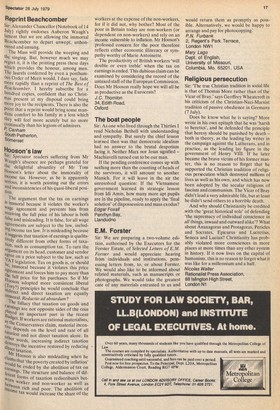Hooson's law
Sir: Spectator readers suffering from Mr Waugh's absence are perhaps grateful for the delightful absurdity of Mr Tom Hooson's letter about the immorality of income tax. However, as he is apparently serious, it is worth pointing out the errors and inconsistencies of his quasi-liberal position.
The argument that the tax on earnings is immoral because it violates the worker's wage agreement and prevents him from receiving the full price of his labour is both also and misleading. It is false, for all wage ,agreements are subject to the law, including income tax law. It is misleading because it suggests that taxation of earnings is qualita tively different from other forms of taxation, such as consumption tax. To turn the argument on its head, customer and vendor agree on a price subject to the law, such as t‘)/AT legislation. Tax on goods is, or should e, immoral because it violates this price "treement and forces him to pay more than '" full price for his purchases. So if Mr (1.,°0son adopted more consistent liberal "°rY?) principles he would conclude that .ndirect and direct taxation are equally unmoral. Reductio ad absurdum? The fallacy that taxation on goods and n; ear , rigs are not opposite sides of the coin 141aYed an important part in the recent udget. If workers are rational materialists, the Conservatives claim, material incen. ve depends on the level and rate of all toakation and not direct taxation alone. In ,ther words, increasing indirect taxation lide.stroys the incentive restored by reducing 'Net taxation. Hooson is also misleading when he :au% that 'the poverty created by inflation' Zild be ended by the abolition of tax on f..ruings. The structure and balance of difw`erent forms of taxation redistributes betbju Worker and non-worker as well as ine`Ween rich and poor. The abolition of °me tax would increase the share of the workers at the expense of the non-workers, for if it did not, why bother? Most of the poor in Britain today are non-workers (or dependent on non-workers) and rely on an income vulnerable to inflation. Mr Hooson's professed concern for the poor therefore reflects either economic illiteracy or sympathy worthy of Marie Antoinette.
The productivity of British workers 'will double or even treble' when the tax on earnings is ended. This dubious claim can be examined by considering the record of the untaxed staff of the European Commission. Does Mr Hooson really hope we will all be as productive as the Eurocrats?
J.C. Thornton 34, Edith Road, Oxford






































 Previous page
Previous page